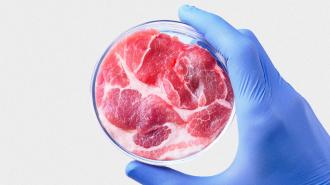Two startups now have permission to sell their lab-grown chicken in the US — the first approval of any cultivated meat in the nation.
The challenge: Meat production is bad for the environment, with livestock generating 14.5% of global greenhouse gas emissions. The raising of animals just to slaughter them is also ethically questionable in itself, not to mention the often dreadful conditions in factory farms.
Despite this, demand for meat has never been higher, and experts predict we could be consuming 550 million tons globally by 2050.
Cultivated meat can be a better flavor match than plant-based meat alternatives.
Cultivated meat: Rather than coming directly from slaughtered livestock, “cultivated” meat is grown from cells taken from living animals. Under the right conditions, these cells multiply, and once there are enough of them, they can be fashioned into burgers, nuggets, and more.
Because lab-grown meat is molecularly identical to the kind in animals, it can be a better flavor match than plant-based meat alternatives, and in the decade since the creation of the first lab-grown burger, the cost of production has fallen dramatically (though it’s still not cheap).
Double serving: In December 2020, Singapore became the first nation in the world to approve cultivated meat, giving US-based startup Eat Just permission to sell lab-grown chicken.
Now, US regulators have also given the greenlight to Eat Just’s chicken (under its GOOD Meat brand), as well as lab-grown chicken made by Upside Foods, marking that startup’s first approval anywhere in the world.
Both startups plan to introduce Americans to their lab-grown chicken through restaurants.
Order up: After its approval in Singapore, Eat Just didn’t start by selling its lab-grown chicken in grocery stores. Instead, it partnered with local restaurants and food delivery companies to serve customers dishes made with the meat.
It plans to take the same approach in the US, announcing that it has already begun making a batch of lab-grown chicken for world-renowned chef José Andrés, to be served it at an as-yet-unspecified restaurant in Washington DC.
Upside Foods also plans to introduce Americans to its lab-grown chicken through a restaurant.
“We’re thrilled to share that our cultivated chicken will soon be available to the public for the first time at San Francisco’s Bar Crenn, prepared by 3-Michelin Star chef Dominique Crenn,” the company revealed on its website.
Anyone interested in being one of the first US diners to taste Upside’s cultivated meat can enter for a chance to win a free meal at Bar Crenn and a tour of the startup’s production facility through its Instagram page.
Looking ahead: As of March 2023, just one restaurant was selling Eat Just’s chicken in Singapore, and quantities were limited to just six servings per week. Those were being sold at a loss, and it’s likely both startups will lose money serving their lab-grown chicken to US diners.
Still, now that they’ve cleared regulatory hurdles in the US, the companies can focus on scaling up production and lowering costs, while using the restaurant trials to learn more about how chefs and diners feel about their futuristic fowl.
We’d love to hear from you! If you have a comment about this article or if you have a tip for a future Freethink story, please email us at [email protected].






